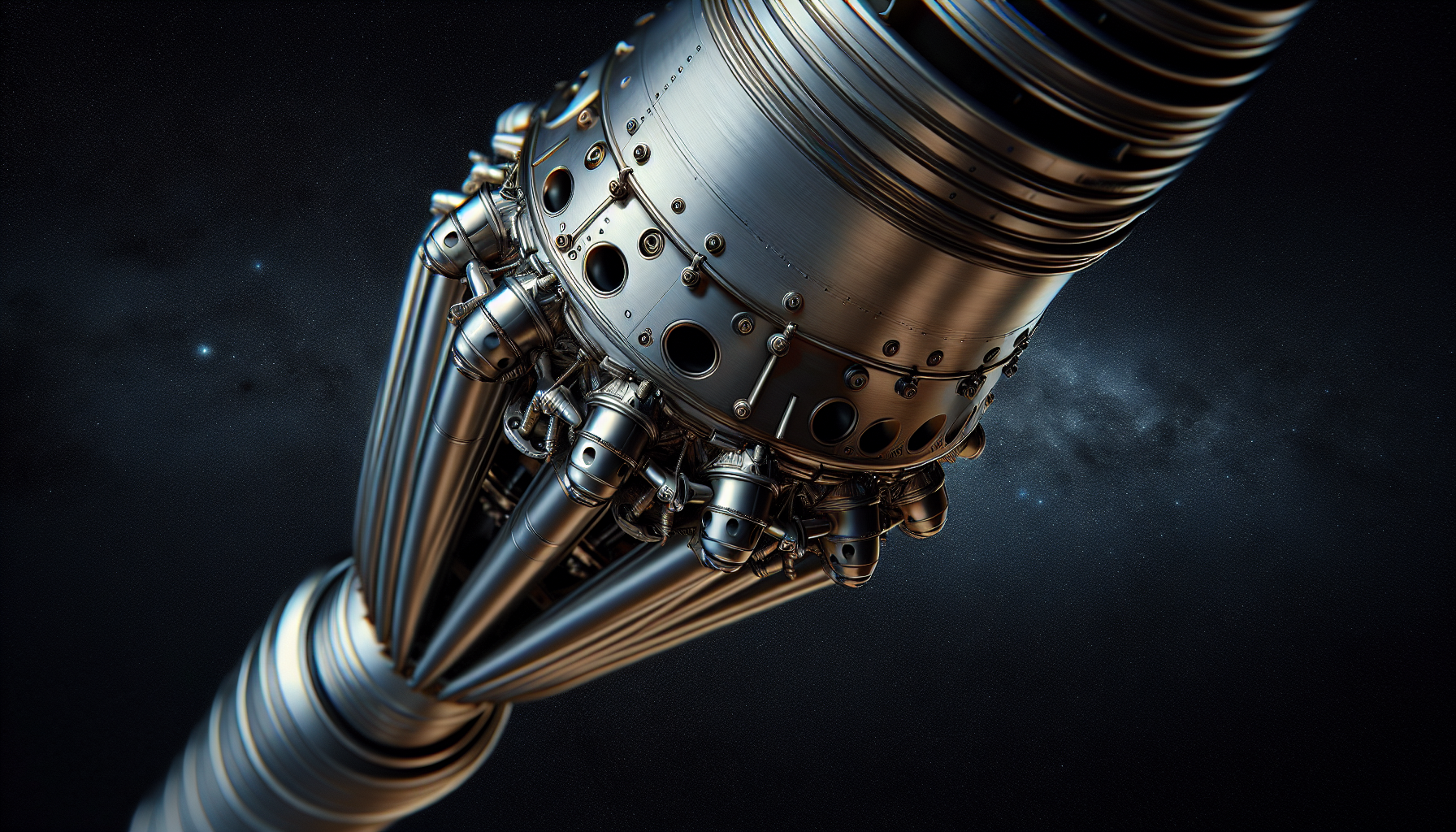We all dream of the vastness of space and the wonders it holds, but have you ever wondered about the economics behind space exploration? Inflation plays a crucial role in determining the cost and feasibility of venturing into outer space. As we venture into this article, we will explore the intricate relationship between inflation, money, and the enigmatic world of space exploration. Prepare to embark on a journey that will challenge your perception of money and unveil the secrets of the inflation monster lurking within our economic landscape.

Overview of Inflation
Definition of inflation
Inflation refers to the sustained increase in the general price level of goods and services in an economy over a period of time. It often erodes the purchasing power of money, as the same amount of currency can buy fewer goods and services. Inflation is measured using various indices such as the Consumer Price Index (CPI) or the Producer Price Index (PPI), which track the changes in prices of a basket of goods and services.
Causes of inflation
Inflation can be caused by several factors, including demand-pull inflation and cost-push inflation. Demand-pull inflation occurs when aggregate demand exceeds aggregate supply, putting upward pressure on prices. This can happen due to increased consumer spending, government expenditure, or investment. On the other hand, cost-push inflation occurs when there is an increase in production costs, such as wages, raw materials, or taxes, leading to higher prices.
Types of inflation
There are various types of inflation, including moderate inflation, hyperinflation, and deflation. Moderate inflation refers to a gradual and steady increase in prices, which is typically targeted and controlled by central banks through monetary policy. Hyperinflation, on the other hand, is an extreme form of inflation characterized by rapid and uncontrollable increases in prices. Deflation, meanwhile, refers to a sustained decrease in the general price level, which can have adverse effects on an economy, such as decreased consumer spending and investment.
Effects of inflation on the economy
Inflation has both positive and negative effects on the economy. On the positive side, moderate inflation can stimulate economic growth by encouraging consumer spending and investment. It can also help reduce the real burden of debt, as the value of money decreases over time. However, high and unpredictable inflation can have detrimental effects. It erodes the purchasing power of individuals and reduces consumer confidence. It can also distort resource allocation, as individuals and businesses may focus more on inflation-hedging activities rather than productive investments. Additionally, inflation can lead to higher interest rates, which can hinder borrowing and investment.
Space Exploration: Introduction
Definition of space exploration
Space exploration refers to the human endeavor of discovering and exploring outer space beyond the Earth’s atmosphere. It involves the use of various technologies and vehicles to explore celestial bodies, study the universe, and expand our knowledge of space. Space exploration encompasses activities such as satellite launches, space missions, space telescopes, and the study of planets, stars, and galaxies.
Historical background
The concept of space exploration has fascinated humans for centuries. It was during the mid-20th century that significant strides were made in this field, primarily driven by the Cold War rivalry between the United States and the Soviet Union. The launch of the Soviet satellite Sputnik in 1957 marked the beginning of the space race, with both nations competing to achieve significant milestones in space exploration. This rivalry led to major breakthroughs, including the first human spaceflight by Yuri Gagarin aboard Vostok 1 in 1961 and the Apollo 11 mission, which successfully landed astronauts on the moon in 1969.
Significance of space exploration
Space exploration has profound significance for both scientific and societal reasons. From a scientific perspective, it allows us to expand our understanding of the universe, explore new frontiers, and study the origins of celestial bodies. It has led to groundbreaking discoveries, such as the existence of exoplanets, the discovery of water on Mars, and the detection of gravitational waves. Space exploration also has societal benefits, including advancements in telecommunications, weather forecasting, and navigation systems. Moreover, it serves as a symbol of human achievement, inspiring future generations and fostering international cooperation.

The Economics of Space Exploration
Costs and funding of space exploration
Space exploration comes with significant costs, primarily due to the complexity and technological requirements involved. Building and launching satellites, designing and manufacturing spacecraft, conducting space missions, and supporting human spaceflight programs all require substantial financial resources. These costs include research and development expenses, infrastructure investment, and operational costs. Funding for space exploration typically comes from government budgets, with space agencies like NASA receiving allocations for their programs. In recent years, there has also been an increase in private sector involvement, with companies like SpaceX and Blue Origin investing in space exploration ventures.
Role of government and private entities
Both government and private entities play essential roles in advancing space exploration. Governments are major stakeholders in space exploration, as they provide funding, set policies, and coordinate international collaboration. Government agencies such as NASA (National Aeronautics and Space Administration) in the United States and Roscosmos in Russia have made significant contributions to space exploration. Private entities, on the other hand, bring innovation, competition, and funding to the industry. Companies like SpaceX and Blue Origin, led by Elon Musk and Jeff Bezos respectively, have revolutionized space exploration with reusable rockets and ambitious plans for human colonization of other planets.
Economic benefits of space exploration
Space exploration has wide-ranging economic benefits. It stimulates technological advancements and innovation, leading to the creation of new industries and job opportunities. The development of space technologies often translates into spin-off technologies that have practical applications on Earth, such as satellite communication, GPS, and medical imaging. Moreover, space exploration drives demand for various goods and services, including aerospace manufacturing, research and development, and space tourism. It also fosters international collaboration and cooperation, promoting trade relationships and diplomatic ties between nations.
Inflation and Space Exploration
Impact of inflation on space exploration
Inflation has significant implications for space exploration, affecting both the costs and funding of space programs. As prices rise over time, the cost of building and launching spacecraft, conducting research, and supporting space missions also increases. This places a strain on the budgetary allocations for space exploration, as the same amount of funding can potentially cover fewer activities due to inflation. Inflation can also lead to uncertainties in long-term budget planning and project timelines, making it challenging to allocate resources effectively.
Cost escalation due to inflation
Inflation can result in cost escalation for space exploration projects. As inflation erodes the purchasing power of money, the materials, equipment, and labor required for space missions become more expensive. This can delay or limit the scope of planned missions, as the available funding may not be sufficient to cover all the necessary expenses. Additionally, inflation can increase the maintenance and operational costs of existing space infrastructure, causing budgetary constraints for ongoing programs.
Budgetary challenges
Inflation poses significant budgetary challenges for space exploration agencies and organizations. With limited resources, they need to prioritize their activities and make difficult decisions regarding project funding. In a high-inflation environment, the purchasing power of allocated budgets decreases, making it more difficult to fund essential research, technology development, and space missions. This can lead to project delays, cancellations, or compromises in quality, ultimately hindering progress in space exploration.
Inflation’s effect on space technology and research
Inflation can also impact space technology and research. The rising costs due to inflation may result in reduced investment in research and development, limiting the pace of technological advancements. As funding becomes scarce, space agencies and organizations might have to allocate a significant portion of their budgets towards simply maintaining existing infrastructure and equipment, leaving fewer resources for new research initiatives. This can slow down the development of cutting-edge technologies needed for future space exploration missions.

Space Exploration’s Relationship with Inflation
Interdependence between space exploration and inflation
Space exploration and inflation are interconnected in various ways. As the costs of space exploration increase due to inflation, it becomes essential to secure sufficient funding to maintain and advance space programs. Conversely, the economic benefits and technological advancements resulting from space exploration can contribute to mitigating the impact of inflation by driving economic growth and innovation. Therefore, the relationship between space exploration and inflation is dynamic and multifaceted.
Inflation’s impact on space industry growth
Inflation can have both positive and negative impacts on the growth of the space industry. On one hand, rising costs due to inflation might deter investment and limit the expansion of space-related industries. The higher expenses associated with space exploration projects can discourage private entities from participating, potentially slowing down the growth of the sector. On the other hand, the economic benefits generated by space exploration, such as job creation and technological advancements, can stimulate overall economic growth and mitigate the impact of inflation on the industry.
Inflation’s role in shaping space policies
Inflation can influence the formulation of space policies at both the national and international levels. Inflationary pressures and limited resources may prompt governments to reassess their priorities and allocate funds away from space exploration. This can lead to shifts in national space policies, deprioritizing certain missions or reducing investment in research and development. Furthermore, international collaboration and partnerships in space exploration can be impacted by changes in inflation rates and economic conditions, potentially altering the course of joint space exploration initiatives.
Inflation as a driver for space exploration
Paradoxically, inflation can also act as a driver for space exploration. In times of high inflation, governments and private entities may seek alternative investments to preserve the value of their assets. The potential economic benefits of space exploration, such as the development of new industries and the exploitation of space resources, can make it an attractive avenue for investment. Inflation may thus incentivize increased funding and support for space exploration in an effort to diversify investments and mitigate the effects of inflation on traditional asset classes.
Examples of Inflation’s Effect on Space Exploration
NASA’s budget over time
The budget of NASA, the premier space exploration agency in the United States, has seen fluctuations over time, influenced by inflation and changing political priorities. The funding levels for NASA have varied, with peaks during the Apollo program in the 1960s and troughs during periods of austerity. Adjusted for inflation, the purchasing power of NASA’s budget has declined at certain points, affecting the agency’s ability to execute ambitious space missions and advance technology development.
Inflation-adjusted cost comparison of space missions
When comparing the costs of space missions over time, it is crucial to consider inflation. Without adjusting for inflation, it may appear that the cost of space exploration has increased significantly. However, when accounting for inflation, the relative costs can be better understood. For example, the cost of the Apollo program, which successfully landed humans on the moon, would be significantly higher in today’s dollars due to inflation, but the adjusted cost provides a more accurate basis for comparison.
Space technology development and inflation
Inflation can impact the development of space technologies. The rising costs of research and development due to inflation may necessitate cost-saving measures or compromises in the scope and quality of projects. This could hinder the progress of technological advancements needed for space exploration, potentially slowing down the pace of innovation. Additionally, inflationary pressures might reduce private sector investment in space technology startups, limiting the availability of funding for breakthrough innovations.
Mitigating Inflation’s Impact on Space Exploration
Government policies and measures
Governments can implement various policies and measures to mitigate the impact of inflation on space exploration. This includes securing consistent and sustainable funding for space agencies, even in the face of inflationary pressures. Governments may also explore cost-saving strategies, such as streamlining bureaucracy, fostering public-private partnerships, and promoting international collaboration to share costs and resources. Additionally, transparent and predictable space policies can provide stability and encourage long-term investments in space exploration.
Efficiency and cost-saving initiatives
Efficiency and cost-saving initiatives can help offset the impact of inflation on space exploration. This includes improving manufacturing processes, adopting reusable technologies, and maximizing the lifespan of equipment and infrastructure. By reducing the costs associated with building and launching spacecraft, conducting research, and maintaining existing systems, space exploration organizations can stretch their budgets further and achieve more within limited resources.
Public-private partnerships
Engaging in public-private partnerships can provide an avenue for mitigating inflation’s impact on space exploration. Collaborating with private entities can leverage their financial resources, expertise, and innovation capabilities to supplement government funding. Public-private partnerships can also help distribute risks, share costs, and foster competition, driving efficiency and technological advancements. By sharing responsibilities and resources, space exploration initiatives can navigate the challenges posed by inflation while promoting further industry growth.
Space industry collaborations
Collaborations within the space industry can also play a role in mitigating inflation’s impact. Space agencies, research institutions, and private companies can form alliances to pool resources, share expertise, and jointly develop technologies. By coordinating efforts, avoiding duplication, and optimizing resource allocation, collaborations can help optimize the efficiency and effectiveness of space exploration projects. This extends to international collaborations, where countries can combine their strengths and capabilities to overcome budgetary constraints imposed by inflation.
Future Outlook: Inflation and Space Exploration
Anticipated effects of inflation on space exploration
Looking to the future, inflation is likely to continue exerting its influence on space exploration. As global economies fluctuate and inflation rates vary, space programs will need to adapt and find ways to secure funding and manage costs effectively. Inflation’s impact on purchasing power could potentially delay or limit the scope of ambitious space missions. However, advancements in technology and new funding models, including private sector involvement, may provide opportunities to counteract inflation’s negative effects.
Space exploration’s role in combating inflation
Space exploration can contribute to combating inflation through economic growth and technological advancements. The development of new industries, job creation, and the fostering of innovation generate economic activity that can stimulate overall economic growth and help counteract the negative effects of inflation. Technological advancements resulting from space exploration can also lead to cost-saving measures and efficiency improvements in various sectors, potentially alleviating inflationary pressures in the long run.
Technological advancements and cost reduction
Technological advancements will play a crucial role in reducing the cost of space exploration and mitigating the impact of inflation. The development of reusable rockets, more efficient propulsion systems, and advanced manufacturing techniques can significantly lower the overall expenses associated with space missions. Additionally, advancements in automation, artificial intelligence, and robotics can improve operational efficiency and reduce labor costs. These technological breakthroughs have the potential to make space exploration more cost-effective and accessible, even in high-inflation environments.
Ethical Implications: Inflation and Space Exploration
Prioritization of space exploration funding
In a high-inflation environment, the prioritization of space exploration funding raises ethical considerations. Governments and organizations need to balance the fiscal demands of space exploration with other pressing societal needs, such as education, healthcare, and poverty alleviation. Ethical decision-making is required to ensure that the allocation of resources for space exploration retains a just and equitable distribution of resources, taking into account the well-being of all citizens.
Allocation of resources in a high-inflation environment
Managing resource allocation in a high-inflation environment requires ethical considerations. When budgets are strained due to inflation, difficult choices need to be made regarding which space exploration projects receive funding. Ethical frameworks, such as cost-benefit analysis and impact assessment, can help guide decision-making and ensure that resources are allocated in a way that maximizes societal benefits and minimizes negative consequences.
Equitable access to space technology
Inflation’s impact on the economics of space exploration raises concerns about equitable access to space technology. As costs rise due to inflation, there is a risk that the benefits and opportunities associated with space exploration become skewed towards those with greater financial means. Ensuring equitable access to space technology and its benefits requires proactive measures, such as international cooperation, knowledge-sharing, and policies that promote inclusivity and accessibility.
Balancing space exploration with social and economic needs
Finding a balance between space exploration and other social and economic needs is an ethical challenge in the face of inflation. While space exploration offers significant scientific and economic benefits, it is essential to ensure that the pursuit of these goals does not come at the expense of addressing pressing societal issues. Ethical decision-making should consider the trade-offs and long-term implications of resource allocation, taking into account the needs and aspirations of diverse communities.
Conclusion
Inflation and space exploration are intertwined in complex ways. Inflation impacts the costs, funding, and growth of space exploration, while space exploration, in turn, can contribute to mitigating inflation’s effects through economic growth and technological advancements. Understanding the relationship between inflation and space exploration is crucial for policymakers, space agencies, and the public to navigate the challenges and opportunities presented by the intersection of these two domains. By addressing the economic, technological, and ethical implications, we can foster a sustainable and inclusive future for space exploration while managing the impact of inflation.




